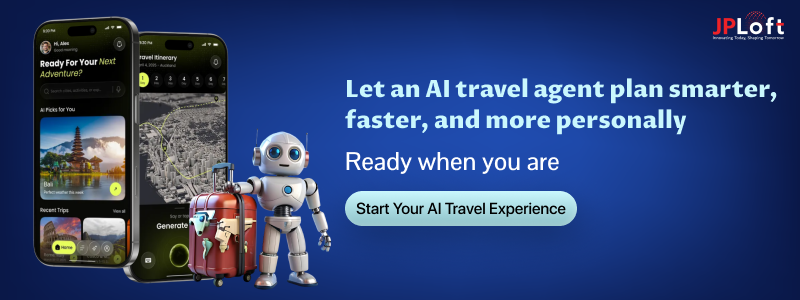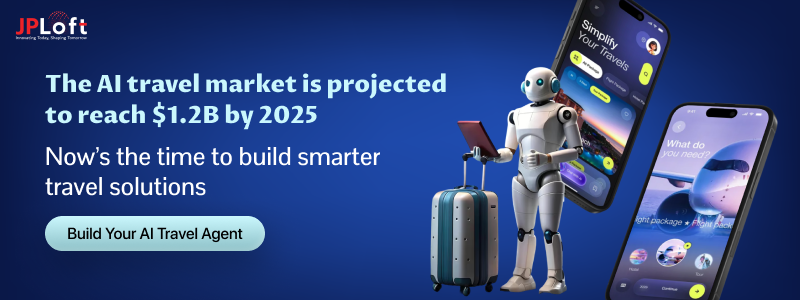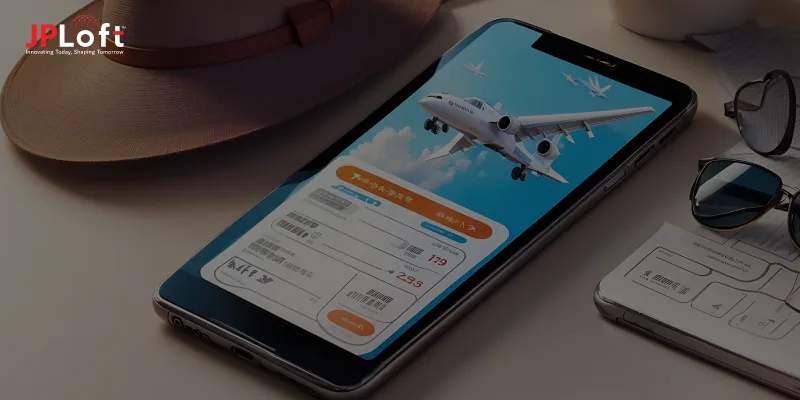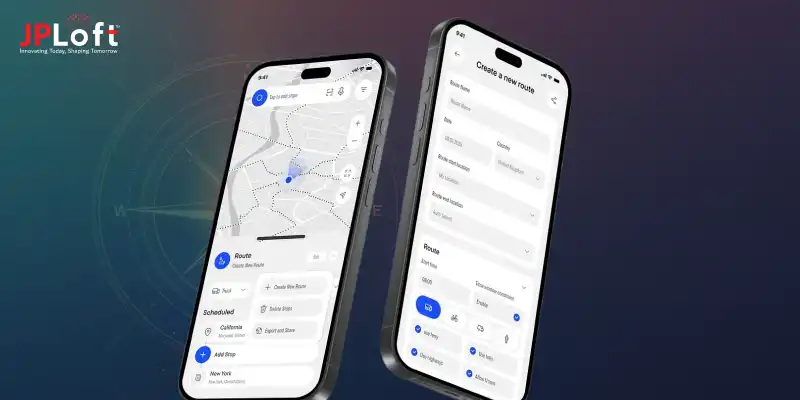What is a Travel AI Agent and Why 2025 is the Year to Build One?
"The real voyage of discovery consists not in seeking new landscapes, but in having new eyes." — Marcel Proust
Today, those “new eyes” could be powered by artificial intelligence. Ever wished you had a personal travel assistant who could plan your trip, book your flights, and even suggest hidden gems you’d never find on Google? That’s exactly what a travel AI agent does, but faster, smarter, and available 24/7.
With AI tech evolving at lightning speed, 2025 is shaping up to be the year these artificial intelligence travel agents go mainstream. From real-time itinerary updates to hyper-personalized recommendations, they’re transforming how we explore the world.
In this guide, we’ll walk you through everything: features, costs, case studies, and step-by-step guide to build an AI travel agent that travelers will actually love.
Key Takeaways
AI-powered travel agents enhance user experience by providing personalized recommendations and seamless booking options.
Real-time updates, reliable APIs, and robust security are crucial to prevent errors and maintain traveler trust.
Building a complete AI travel agent, not just adding AI features, keeps your solution competitive in 2025.
Continuous maintenance, scalability planning, and bias-free AI training are essential for long-term success.
Partnering with experts like JPLoft can streamline AI travel agent development and deliver high-quality results.
AI Travel Agents Explained: Everything You Need to Know
At its core, an AI travel agent is a digital assistant that uses artificial intelligence to plan trips, book services, and offer tailored recommendations all in real time. Think of it as an upgrade from traditional booking sites, where AI for travel agents bridges the gap between human expertise and machine efficiency.
These travel AI agents can analyze thousands of flights, hotels, and activities in seconds, learning your preferences with every interaction. Whether you’re looking for budget-friendly stays, luxury packages, or spontaneous weekend getaways, AI travel agents can adapt instantly.
Over time, travel artificial intelligence agents have evolved into full-service travel artificial intelligence agents, combining natural language processing, predictive analytics, and data from multiple travel APIs. Similarly, artificial intelligence travel agents integrate voice commands, chat, and smart recommendations to deliver a seamless booking experience, reshaping the travel industry in line with AI in hospitality trends.
Why Build an AI Travel Agent? Benefits for Businesses and Travelers
Build an AI app that serves as a travel agent, and you’ll quickly see why businesses and customers are embracing this technology. From boosting scalability to offering round-the-clock convenience, travel artificial intelligence agents can transform the travel experience. Here’s how:
A] Scalability Without Extra Staff
Travel AI agents let businesses handle thousands of customer queries simultaneously without hiring more employees. This scalability ensures peak travel seasons don’t compromise service quality, reducing operational stress while improving profit margins.
B] Personalized Recommendations at Scale
By analyzing user data and preferences, these travel AI agents deliver custom itineraries, hotel options, and activity suggestions. This creates memorable travel experiences while building brand loyalty through hyper-relevant offers.
C] Lower Operational Costs
AI automates repetitive tasks like ticket booking, cancellations, and itinerary changes, significantly cutting labor expenses. This cost reduction also frees resources for marketing and innovation, allowing companies to focus on improving services and enhancing customer experience.
D] 24/7 Availability and Instant Updates
Unlike human agents, virtual travel agent AI platforms are always online, offering real-time updates on flight delays, weather changes, or safety alerts. Travelers benefit from peace of mind knowing accurate information is just a tap away.
E] Enhanced User Experience Through Rich Features
With tools like instant translation, expense tracking, and AR-based navigation, AI agents make journeys smoother and more engaging. Businesses that align with the latest travel app development trends by integrating such advanced functionalities can stand out in a competitive market.
By aligning with modern AI travel agent development guides, businesses can secure long-term loyalty and growth.
Top Features to Include in Your AI Travel Agent
A great AI travel agent planner is more than just a chatbot that books tickets; it’s a full-service travel companion powered by advanced algorithms.
Modern agentic AI travel can predict traveler preferences, adjust plans on the fly, and deliver hyper-personalized suggestions that feel tailor-made.
By combining innovation with top travel app features, businesses can ensure their AI travel agent remains both competitive and user-friendly.
If you’re exploring steps to build an AI travel agent, these are must-have features:
1. Smart Booking Engine
Let your AI agent for travel booking handle flights, hotels, car rentals, and even local activities in one place. With intelligent search filters, it ensures the best prices and availability without users juggling multiple apps.
2. Personalized Recommendations
Use AI tools for travel agents to suggest destinations, restaurants, and attractions based on user behavior. Over time, your AI travel agent app learns preferences, delivering suggestions that feel curated by a personal concierge.
3. Multi-Language Support
AI travel agents free or premium can cater to global travelers with seamless translations. Real-time voice and text translation makes it easier for users to interact with locals and navigate unfamiliar environments.
4. AR and VR Previews
Give customers a taste of their destination before they arrive, a big trend in AR in travel apps. From exploring hotel rooms to walking through tourist spots virtually, it enhances decision-making.
5. Advanced Security Protocols
Implement encryption, AI-powered fraud detection, and compliance with the travel app security guide standards to protect data and transactions.
6. Integration with Popular Apps
Sync itineraries with calendars, maps, and even music playlists for the trip. This makes the travel experience smoother, especially for those juggling work and leisure schedules.
7. Real-Time Itinerary Updates
Automatically adjust plans based on delays, weather changes, or local events. This proactive feature keeps travelers informed and stress-free during their journey.
8. Expense Tracking and Budget Suggestions
Help travelers manage costs by tracking expenses in real time. AI can suggest cheaper alternatives without compromising on experience.
Whether you’re aiming to develop an AI travel agent or a niche solution for a specific traveler segment, combining innovation with user-centric design is key. For niche targeting or market differentiation, consider referencing proven models like How to create an app like Omio to shape your feature roadmap.
Steps to Build an AI Travel Agent
Building a successful AI agent travel planner requires a well-structured approach. From market research to deployment, each step ensures your travel AI agent offers value, efficiency, and user satisfaction.
By integrating core AI features and following best travel app development practices, you can create a powerful travel solution that stands out in the competitive landscape. For beginners, understanding how to create a travel app provides a strong foundation before scaling into advanced AI-driven solutions.
Here’s an AI travel agent development guide broken into clear phases:
Step 1: Market Research and Goal Setting
Before development, understanding your audience, competitors, and target market is critical. This step ensures your agentic AI for travel aligns with user needs and industry standards.
► Define Target Audience
Identify who will use your AI agent. Consider demographics, travel habits, and tech-savviness. Understanding your users helps prioritize features that enhance engagement and satisfaction.
► Analyze Competitors
Study existing travel AI agents and online travel platforms. Tools like SWOT analysis can reveal opportunities to innovate and differentiate your product. Learning from successful examples reduces development risks.
► Set Clear Objectives
Define the purpose of your AI travel agent. Whether it’s personalized recommendations, automated bookings, or predictive travel planning, having clear goals ensures your app development stays focused and results-driven.
► Choose Platform and Target Markets
Decide whether your AI agent will launch on iOS, Android, or web platforms. Understanding platform-specific constraints ensures smoother development and deployment. Selecting the right platform also helps optimize costs, reach the intended audience, and improve user adoption rates.
Step 2: Feature Planning and AI Model Selection
Selecting the right features and AI models determines your travel agent’s intelligence, efficiency, and user satisfaction.
► Predictive Analytics
Implement AI models capable of predicting travel trends, preferences, and pricing. Incorporating predictive analytics improves user engagement and gives businesses a competitive advantage in the travel industry.
► Natural Language Processing
Enable conversational AI for queries and bookings. A seamless, human-like interaction enhances user experience and trust. NLP is crucial for voice commands and chat features in AI travel agents.
► Integration with Booking Systems
Connect with global booking APIs to offer real-time availability and pricing. Reliable integrations reduce errors and elevate user confidence.
► Security and Data Privacy
Incorporate encryption, secure storage, and compliance with regulations. Protecting user data builds trust, especially when dealing with travel bookings and payment details.
Step 3: UX/UI Design
User experience directly impacts engagement and retention. Intuitive interfaces make complex AI features approachable.
► Mobile-Optimized Design
Design responsive layouts for various devices. A clean, easy-to-navigate interface encourages users to explore features. Following how to design travel app principles ensures your app looks professional and functional.
► Personalization and Recommendations
Tailor the interface and content based on user behavior and preferences. Personalized suggestions increase app usage and satisfaction.
► Accessibility and Usability
Ensure your app supports accessibility features like voice commands and readable fonts. A user-friendly interface caters to diverse audiences, enhancing inclusivity.
► Feedback Mechanisms
Include in-app reviews and feedback options. Users can report issues or request features, enabling continuous improvement and stronger engagement.
Step 4: Backend Development and AI Integration
A robust backend supports AI functions, data management, and seamless user interactions.
► Server and Database Architecture
Set up scalable, secure servers to manage user data and AI computations efficiently. Choosing the right mobile app tech stack is crucial here, as it ensures smooth performance, scalability, and stability even under high traffic.
► API and Third-Party Integrations
Integrate with travel databases, payment gateways, and booking systems. Smooth API connections guarantee real-time updates and accurate information.
► Team and Expertise
Assemble skilled developers, AI engineers, and data scientists. Hiring the right talent is critical, and leveraging hired dedicated developers ensures quality and faster execution.
► AI Model Deployment
Deploy AI models to production while monitoring performance. Continuous evaluation ensures recommendations and predictions remain accurate and relevant.
Step 5: Testing, Deployment, and Maintenance
Ensuring quality and reliability is crucial for long-term success.
► Quality Assurance Testing
Conduct rigorous functional, usability, and performance tests as part of comprehensive mobile app testing. This process helps identify and fix bugs early ensuring reliability and delivering a smooth user experience.
► Beta Testing
Release a limited version to a small user group. Collect feedback to refine features and detect potential issues before a full-scale launch.
► Continuous Updates and Improvements
Regularly update AI algorithms, features, and interface designs based on feedback. Collaborating with expert mobile app maintenance services ensures your application stays updated, stable, and efficient across platforms.
► Monitoring and Analytics
Track usage, engagement, and performance metrics. Ongoing travel app maintenance guided by analytics helps your AI travel agent evolve with user needs and remain competitive in the market.
By following these steps to build an AI travel agent, you can confidently move from concept to launch. For beginners, a guide to build an AI travel agent ensures you cover essentials without missing critical details.
What’s the Cost to Build an AI Travel Agent?
The cost of building an AI travel agent depends on several factors, from AI model complexity to the level of personalization you want to offer. On average, the cost to build a travel AI agent ranges from $40,000 to $200,000, depending on features, third-party integrations, and scalability requirements. Here’s a breakdown:
1. AI Model Complexity
The sophistication of your virtual travel booking agent AI greatly affects cost. Basic rule-based AI is cheaper to develop, while advanced machine learning and NLP-driven agents demand higher investment due to training datasets, model tuning, and infrastructure.
2. Features & Functionalities
Core features like trip recommendations, dynamic pricing, and itinerary generation are essential, but adding extras such as multilingual support, voice commands, and live updates increases the cost to develop a travel app. Feature-rich apps require more development time and budget.
3. Platform & Technology Stack
Deciding between iOS, Android, or cross-platform solutions impacts both cost and reach. A single platform is more budget-friendly, while multi-platform development offers broader audience access but requires more resources.
4. Third-Party Integrations
Integrating APIs for hotel bookings, flight reservations, and payment gateways adds both convenience and expense. Complex integrations, similar to those in premium apps, can raise the cost to create an app like Agoda.
5. Security & Compliance
Data protection is critical for any AI agent for travel. Implementing encryption, GDPR compliance, and fraud prevention measures increases development cost but ensures user trust.
6. Estimated Development Costs
|
Type |
Estimated Cost Range |
Description |
|
MVP (Basic Features) |
$30,000 – $60,000 |
Essential booking & recommendation features |
|
Mid-Tier (AI + Personalization) |
$60,000 – $120,000 |
Advanced AI-driven suggestions & personalization |
|
Enterprise-Grade (Advanced AI + Integrations) |
$120,000 – $200,000+ |
Full-scale platform with premium integrations & scalability |
The cost to develop a travel app like Visit Dubai varies based on development location, team expertise, and complexity.
In short: startups can expect entry-level builds around $30,000, while enterprises may need to invest $200,000+ for a robust AI-powered travel agent.
When you create an AI travel agent with predictive analytics, advanced NLP, and global integrations, costs rise, but so do long-term returns. Businesses should use a guide to build an AI travel agent to balance budgets with growth goals.
Real Life Case Studies of AI Travel Agents
To understand the potential of the best travel apps, let’s explore real-life AI travel agent case studies like Hopper, Skyscanner, TripAdvisor, and Kayak.
These platforms leverage AI to predict flight prices, suggest personalized itineraries, and automate booking processes, providing users with a seamless travel experience. By analyzing their features and user engagement strategies, developers can identify what works best when building their own AI travel solutions.
A) Hopper: Predictive Flight and Hotel Insights
Hopper’s AI system predicts flight and hotel prices, helping travelers book at optimal times. By using a virtual travel booking agent AI, Hopper analyzes billions of data points to provide personalized suggestions.
This makes it one of the best AI travel agent solutions for budget-conscious travelers. Its success highlights how AI travel agents can combine predictive analytics and user-friendly interfaces, serving as a strong reference point for those exploring how to create an app like Hopper.
B) Skyscanner: Smarter Travel Planning
Skyscanner integrates an AI agent for travel booking features to recommend flights, accommodations, and packages.
Its AI algorithms track historical trends and real-time availability, enabling travelers to plan efficiently. This approach demonstrates how AI travel agent apps enhance the booking experience while reducing the workload for human agents. Additionally, Skyscanner’s interface serves as an excellent example of building an intuitive and data-driven travel app.
C) TripAdvisor: Personalized Recommendations
TripAdvisor employs AI tools for travel agents to provide personalized recommendations for hotels, activities, and restaurants. Its AI-powered engine acts as an AI agent for travel planning, analyzing reviews, preferences, and local trends.
Travelers can enjoy customized suggestions, proving the power of artificial intelligence travel agents in real-world scenarios. For developers looking to replicate this success, understanding how to make an app like tripadvisor is crucial for integrating recommendation engines effectively.
D) Kayak: Dynamic Search and Alerts
Businesses exploring how to develop an app like Kayak can take inspiration from its AI-driven approach to dynamic search and alerts. Kayak uses an AI agent for travel technology to dynamically adjust search results and notify users of the best deals.
Its AI travel booking agent capabilities showcase how travel AI agents can reduce planning time while increasing booking accuracy. Startups aiming to implement similar systems can explore creating app solutions that support AI integration and real-time analytics for travelers.
Other niche examples include honeymoon travel AI agent services for couples seeking personalized packages.
These case studies highlight that agentic ai in the travel industry is no longer futuristic, it’s actively shaping smarter, more efficient, and personalized travel experiences. Integrating a travel agent planner and virtual travel agent ai functionalities can help businesses deliver innovative services while staying competitive in the digital travel landscape.
Each of these examples reflects successful AI travel agent development, showing how companies make AI travel agents that dominate markets.
Challenges to Overcome While Creating an AI Travel Agent
Developing an AI travel agent comes with unique hurdles that can impact both functionality and user trust. Understanding these travel app development challenges early ensures smoother development and deployment.
► Data Privacy & Security
Handling personal traveler information, names, passport details, payment info, requires stringent security protocols. An AI-powered travel agent must comply with GDPR, CCPA, and local regulations to prevent breaches and maintain user trust.
► Real-Time Updates & API Reliability
Flights, hotels, and events change constantly. Your AI agents' travel must fetch real-time data reliably. Unstable or delayed APIs can result in outdated recommendations, booking errors, or frustrated users. This is one reason why online travel apps fail, the inability to provide accurate, up-to-date information leads to poor user experiences.
► Training Data Bias
AI models learn from historical data, which may contain biases. Ensuring your Agentic AI in the travel industry delivers fair, accurate, and inclusive recommendations requires careful data curation, diverse datasets, and ongoing evaluation.
► Legal & Compliance Issues
Travel laws differ across regions, and your AI must adhere to all applicable rules. From cancellation policies to liability clauses, compliance adds complexity to booking logic and recommendation algorithms.
► Maintenance & Scalability
Continuous model updates, bug fixes, and system monitoring are crucial. Using structured mobile app maintenance services ensures your AI agent remains accurate, responsive, and secure as usage grows.
► Vendor & Development Management
Building an AI travel agent often requires coordination with third-party APIs, cloud providers, and expert development teams. Partnering with experienced professionals helps manage technical complexity and ensures timely delivery while maintaining high-quality performance.
Understanding how to develop an AI travel agent means preparing for these issues early.
How AI Travel Agents Generate Revenue in 2025?
A travel AI agent is not just a tool; it’s a revenue-generating business. With the right monetization strategy, a travel AI agent can provide seamless service to travelers while earning consistently.
1. Commission-Based Bookings
The most common model is earning commissions from bookings made via your AI agent for travel booking systems. Airlines, hotels, car rentals, and experiences pay a percentage per confirmed booking. Integrating multiple APIs increases potential revenue streams.
2. Subscription Models
Offer premium subscriptions for enhanced features such as personalized itineraries, early access to deals, or concierge services. This ensures predictable monthly income while adding value for frequent travelers.
3. Advertising & Sponsored Listings
Partner with travel brands, hotels, or event organizers to display targeted promotions within your AI agent. Using travel app monetization strategies, you can boost revenue without compromising user experience.
4. Affiliate Partnerships
Integrate with travel-related services like insurance, visa services, or local tours. Each referral or completed transaction earns your AI agent a commission, creating a passive revenue layer.
5. Data Insights & Analytics
Aggregate anonymized user behavior and booking trends to offer insights to travel companies. Brands pay for actionable data that helps them improve offerings, plan campaigns, or target promotions effectively.
6. White-Label Solutions
License your AI travel agent technology to agencies or startups as a white-label solution. Partnering with an AI agent development company can help you scale this model and reach multiple clients quickly.
7. Add-On Services & Concierge Features
Upsell services like priority support, guided tours, or travel insurance directly through the AI. These premium services enhance the traveler experience while adding additional revenue streams.
If you develop an AI travel agent with these revenue models in mind, profitability becomes part of the design not an afterthought.
Partner with JPLoft and Create Your Dream AI Agent
Bringing your AI travel agent idea to life requires the right expertise and a proven development approach. With JPLoft, you gain a partner who understands both the travel industry and cutting-edge AI technologies.
Leveraging our expertise as a travel app development company, we design intuitive interfaces, robust backends, and scalable AI systems that keep users engaged. From conceptualization to deployment, our team ensures your AI-powered travel agent solutions are not only feature-rich but also reliable, secure, and future-ready.
Whether your focus is virtual travel agent AI, an AI agent travel planner, or free AI travel agent services, we provide end-to-end solutions tailored to your goals. Turn your vision into a reality with JPLoft and deliver seamless travel experiences to your users.
Conclusion
Building a travel AI agent can revolutionize the way travelers plan and book trips, offering personalized recommendations, seamless bookings, and 24/7 support. From selecting the right AI for travel agents tools to integrating features like real-time updates and smart planning, the possibilities are immense.
Whether you’re aiming for a free AI travel agent or a fully scalable AI travel agent app, understanding costs, challenges, and monetization is key. With strategic planning, robust AI models, and user-centric design, your travel AI agents can outperform traditional solutions. Partnering with experts ensures a smooth development journey, helping you create future-ready, intelligent AI agents that delight users worldwide.
FAQs
A travel AI agent leverages artificial intelligence to assist users in planning trips, booking flights or hotels, and offering personalized travel recommendations based on preferences and behavior patterns.
They use machine learning, natural language processing, and predictive analytics to understand user inputs, suggest itineraries, and even automate bookings, making travel planning faster and more efficient.
Some platforms offer limited free AI travel agent services, while enterprise-grade solutions with advanced features may require subscription or one-time payments.
AI agents excel at automation and personalization, but human agents are still valuable for complex, nuanced travel needs and problem resolution.
Trusted AI agent travel platforms follow strict data privacy, encryption, and compliance standards to ensure user information remains secure.
Yes, specialized honeymoon travel AI agent services provide personalized itineraries and recommendations for couples.













Share this blog